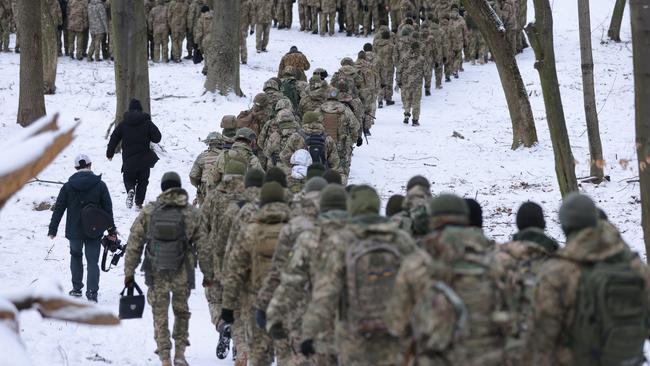Ukraine’s blacklist: Killers, lawyers, writers and spies
The innocent and the guilty alike – including the Pink Floyd star Roger Waters – are named as pro-Russian collaborators online.

Spies, priests, prosecutors and journalists; the innocent and the guilty alike are denounced as pro-Russian collaborators on Ukraine’s online blacklist.
Some of those on the “Myrotvorets” database may have been involved in acts of propaganda or heinous war crimes in the country’s east, but others have done nothing more than offend political or popular sensitivity, or simply used the “wrong” vernacular.
It matters not: one and all are judged by a hidden panel, accused of “deliberate acts against the national security of Ukraine” and have their personal data published alongside their supposed crimes for all to see.
As the threat of Russian invasion mounts, antagonising political schisms and stoking invective within Ukraine, neither rank nor reputation exempts individuals from accusation by Myrotvorets, the name-and-shame website which, in an Orwellian twist, translates as “Peacemaker”.
Among the latest entries on the list of more than 187,000 names is Oleksiy Symonenko, Ukraine’s deputy chief prosecutor. He was accused of rubberstamping a “fabricated charge” by signing an indictment in the case against the former president Petro Poroshenko, the politician and businessman who is President Volodymyr Zelensky’s most potent rival.
Poroshenko arrived back in Kiev last week to stand trial on what many say are trumped-up charges over coal contracts.
“Symonenko’s signature on the Poroshenko indictment was itself a betrayal of the country,” insisted one of Myrotvorets’ founding figures, Ukrainian politician George Tuka. “He absolutely deserves to be blacklisted.”

Symonenko joins a wide cast of supposed collaborators. The blacklist includes not only war criminals and agents of the Russian intelligence service, the FSB, but Pink Floyd’s co-founder Roger Waters, 78, who was denounced as a “threat to national security” in 2018 after he claimed that Russia had more rights to Crimea than Ukraine.
Five hundred Ukrainian public servants, ethnic Hungarians who received Hungarian passports, are also blacklisted: Ukraine forbids dual citizenship and Myrotvorets – whose slogan is “Pro Bono Publico”, “for the public good” – branded them “separatists” and “traitors”.
The website was set up in 2014 after a meeting between Tuka and a former member of Ukraine’s state intelligence service, the SBU, who now runs the site and is known by the alias “Roman Zaitsev”. Tuka denies there is either state funding for the site or that it is controlled by the SBU, insisting it was established to “clean up” Ukraine from pro-Russian sentiment and activity.
“The problem we had back in 2014 is the same we have now: ex-police, ex-military and some political figures whose beliefs remain pro-Russian,” Tuka, 58, said in Kiev. “There was no consolidated official database holding their names. Myrotvorets was set up to fill that gap.”
He added matter of factly: “As time goes on the mission has changed and in the past three years the number of people getting placed on Myrotvorets for political reasons has increased. Now it lists those who protect the narrative of Russia.”
Yevheniy Murayev’s name is here too. The Ukrainian politician, accused by British security agencies at the weekend of being groomed by Moscow as a candidate to lead a post-invasion administration in Kiev, is alleged to be “an accomplice of terrorists and Russian invaders”.
Murayev, 46, who said at the weekend that the British accusations against him were “more Mr Bean than James Bond”, was sanguine when describing the implications of being named by Myrotvorets as a collaborator. “People listed on Myrotvorets can end up dead,” he said. “There is a threat, a risk that involves falling out of a window or having to flee the country. I am aware of that threat, but I live with the risk.”
Several murders have occurred within days of the victims appearing on Myrotvorets. Two pro-Russian figures, Oles Buzina, a publicist, and MP Oleg Kalashnikov were shot dead in Kiev in April 2015 shortly after Myrotvorets published their personal information, including addresses.
“There is no connection to Myrotvorets and their murders,” Tuka said. “But they were both enemies of Ukraine.”
The definition of “pro-Russian sentiment” is so all-encompassing that the blacklist includes the names, details and passport information of 4506 journalists – western, Ukrainian and Russian – who were accredited by separatist press officials, a necessary step to work in areas controlled by pro-Russian forces. Many journalists received threats after personal data, hacked from the separatists’ press office in Donetsk, was exposed on Myrotvorets. “It is a very dangerous list that should be shut down immediately,” Yulia Gorbunova, senior researcher on Ukraine for Human Rights Watch, said.
The Times







To join the conversation, please log in. Don't have an account? Register
Join the conversation, you are commenting as Logout